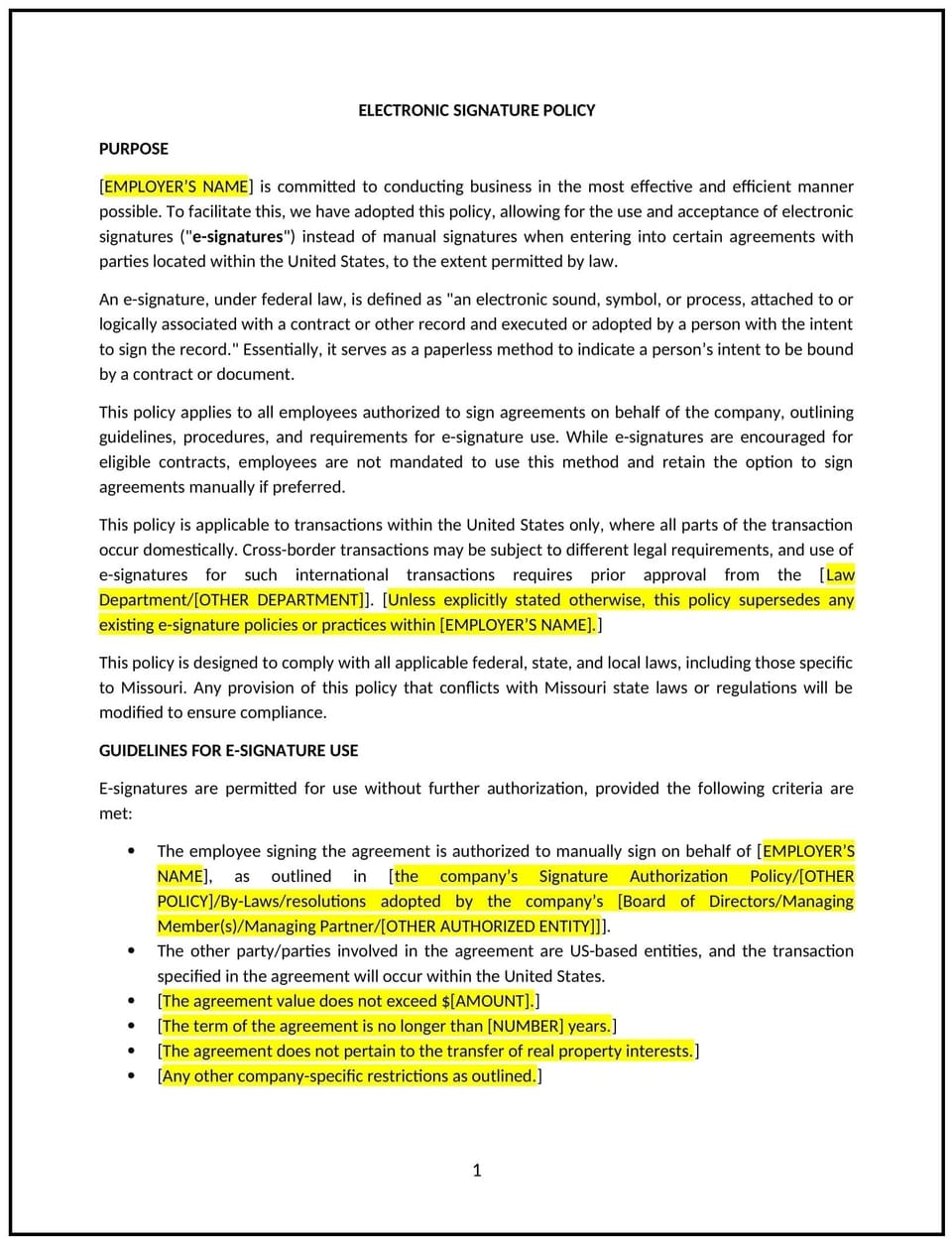Electronic signature policy (Missouri): Free template

Electronic signature policy (Missouri)
An electronic signature policy helps businesses in Missouri manage the use of electronic signatures for documents, contracts, and agreements. This policy outlines the procedures for using electronic signatures, the types of documents that can be signed electronically, and the legal and security requirements necessary for ensuring their validity. It is designed to streamline business operations while maintaining security, accuracy, and legal integrity.
By adopting this policy, businesses in Missouri can reduce paper-based processes, improve operational efficiency, and ensure that electronic signatures are legally recognized and secure.
How to use this electronic signature policy (Missouri)
- Define electronic signature: Clearly define what constitutes an electronic signature under the policy, such as typed names, scanned signatures, or digital signatures.
- Identify acceptable uses: Specify the types of documents that can be signed electronically, such as contracts, agreements, and forms, and any exclusions (e.g., wills, notarized documents).
- Establish security requirements: Outline the security protocols for electronically signed documents, including encryption, authentication, and secure storage, to ensure the integrity of the signed document.
- Set approval processes: Specify how electronic signatures should be obtained, including who can authorize their use, the process for obtaining consent, and how to verify the signer's identity.
- Maintain record-keeping standards: Ensure that electronically signed documents are stored securely, are easily accessible for future reference, and comply with legal and regulatory requirements for document retention.
- Address legal considerations: Ensure that the use of electronic signatures complies with Missouri and federal laws, such as the Uniform Electronic Transactions Act (UETA) and the Electronic Signatures in Global and National Commerce (ESIGN) Act.
- Review and update regularly: Periodically review the policy to ensure it is aligned with technological advancements, legal requirements, and changes in business practices.
Benefits of using this electronic signature policy (Missouri)
This policy provides several benefits for businesses in Missouri:
- Streamlines business processes: Electronic signatures eliminate the need for printing, signing, and mailing documents, reducing processing time and increasing efficiency.
- Reduces costs: By eliminating the need for paper, ink, and postage, businesses can lower operational costs associated with document management.
- Enhances security: Secure electronic signatures provide a level of authentication and verification that reduces the risk of fraud or tampering.
- Supports remote work: Electronic signatures allow for faster document execution, making it easier for remote employees or clients to sign documents without being physically present.
- Increases legal certainty: The use of electronic signatures in accordance with Missouri law and federal regulations ensures that signed documents are legally binding and enforceable.
- Promotes sustainability: By reducing reliance on paper, businesses can contribute to environmental sustainability efforts and reduce their carbon footprint.
Tips for using this electronic signature policy (Missouri)
- Communicate the policy clearly: Ensure that all employees are aware of the policy and understand the appropriate use of electronic signatures in business processes.
- Implement secure tools: Use trusted electronic signature platforms that offer secure encryption, authentication, and compliance with legal requirements.
- Train employees: Provide training on how to use electronic signatures properly and how to identify fraudulent or unauthorized use.
- Ensure document integrity: After a document is electronically signed, ensure that it is stored in a secure system with proper version control to maintain its integrity over time.
- Monitor compliance: Regularly check that electronic signature practices are being followed correctly, and take corrective action if necessary.
- Review the policy regularly: Periodically evaluate the policy to ensure it remains up-to-date with changes in Missouri law, technological advances, or business needs.
Q: Why should businesses in Missouri adopt an electronic signature policy?
A: Businesses should adopt this policy to streamline document signing processes, improve efficiency, reduce costs, and ensure that electronic signatures are secure, valid, and legally binding.
Q: What types of documents can be signed electronically?
A: Businesses should specify which types of documents are eligible for electronic signatures, such as contracts, agreements, or internal forms, and note any exclusions, such as wills or documents requiring notarization.
Q: How can businesses ensure the security of electronic signatures?
A: Businesses should use secure electronic signature platforms that include features such as encryption, multi-factor authentication, and audit trails to ensure the integrity and security of electronically signed documents.
Q: Are electronic signatures legally binding in Missouri?
A: Yes, electronic signatures are legally binding in Missouri, provided they comply with the Uniform Electronic Transactions Act (UETA) and the Electronic Signatures in Global and National Commerce (ESIGN) Act.
Q: How should businesses verify the identity of someone signing electronically?
A: Businesses should establish verification processes, such as requiring email confirmation, using secure authentication methods, or ensuring that the electronic signature platform verifies the signer’s identity.
Q: How should businesses store electronically signed documents?
A: Businesses should store electronically signed documents in a secure, easily accessible system that complies with document retention and legal requirements, ensuring they are protected from tampering.
Q: How often should businesses review their electronic signature policy?
A: Businesses should review the policy regularly, at least annually, to ensure it remains aligned with changes in Missouri law, federal regulations, and business practices.
This article contains general legal information and does not contain legal advice. Cobrief is not a law firm or a substitute for an attorney or law firm. The law is complex and changes often. For legal advice, please ask a lawyer.


